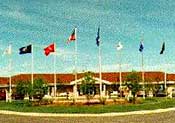State agencies preparing for possible strike
By Laurel Druley
Minnesota Public Radio
September 26, 2001
In the wake of the recent events, state and union leaders are under public pressure to come to a contract agreement. The September 11 terrorist attacks have brought a changed perspective to the negotiating table. Still, more than half of Minnesota's government work force could walk off the job Monday if no agreement is made. State agency officials say they have contingency plans in place to compensate for the void a strike could leave.
STATE EMPLOYEES AND ADMINISTRATORS AGREE - CONTRACT ISSUES
that seemed so important two weeks ago pale in comparison to the ongoing international crisis.
Ken DeCramer, president of the Rochester Department of Transportation union, says two weeks ago state workers were fed up and ready to take action. Today, he says, they have mixed feelings about a strike.
"It went from such a strong unified front - there was such a strong feeling from the members that we need a better contract and we need the insurance to be improved - to go to this with so much mixed feelings, it's really been hard," says DeCramer. "They don't want to do anything that will harm the state. They live here, too. Their families are here and they don't want to create any more problems."
Still, many workers continue to say the pay raise offered by the state is not enough to cover the increase in health care premiums. The members of both the American Federation of State County and Municipal Employees and the Minnesota Association of Professional Employees complain that their wages were frozen in the early 1990s, and have lagged behind the cost of living increases since then.
If there's no last-minute agreement, many workers are still prepared to walk off the job. That means road kill might be left for the birds; road construction projects may stretch into late fall; and some state medical and mental health services could be scaled back. These are just a few of the possible consequences of the potential 29,000 state workers' strike.
State-run veterans facilities and treatment centers would take a hit in the event of a strike. A spokesman from the Minnesota Veterans Home in Luverne says about 80 percent of their employees are union members. He says replacement workers will be brought in, in an effort to keep things "business as usual."
Doctors and registered nurses at the Fergus Falls Regional Treatment Facility would not strike, but all of their nursing assistants, clerical and maintenance staff could. Officials from the Department of Human Services says National Guard troops have been trained over the last few weeks to take over those jobs.
Dennis Stauffer, a Department of Natural Resources spokesman, says his agency has made plans for a potential walkout, too.
"People should expect some reduction in services. We have a lot of people who do very important work, and certainly life will not continue as normal without them," Stauffer says. "But we have tried to identify those things that affect the public and would compromise our work in some major way if we don't maintain them, and we are going to focus on those tasks."
Stauffer assures lakes will still get stocked, wildfires will be prevented and hunting season will continue as scheduled.
Laurie Luethmers, president of the AFSCME union workers at St. Cloud State University, says 350 of their employees are AFSCME workers. They are the support staff - the people who keep computers up and running, serve food in the dining halls, and clean the classrooms, dorms and offices.
"We are the front-line people. We are the ones that students and visitors see before supervisors, managers or administrators. So they're going to have to do our work, basically," Luethmers says. "We're the ones that usually get the grief and the angry students for whatever reason, and now they'll have to deal with it themselves."
Luethmers hopes others don't see a strike as unpatriotic. She says many of the state workers are veterans who fought for the freedom to strike.
More coverage
Mediation resumes - big issues remain
By Laurel Druley
Minnesota Public Radio
September 26, 2001
|
|
RealAudio |
In the wake of the recent events, state and union leaders are under public pressure to come to a contract agreement. The September 11 terrorist attacks have brought a changed perspective to the negotiating table. Still, more than half of Minnesota's government work force could walk off the job Monday if no agreement is made. State agency officials say they have contingency plans in place to compensate for the void a strike could leave.
| |
|
|
|
||
Ken DeCramer, president of the Rochester Department of Transportation union, says two weeks ago state workers were fed up and ready to take action. Today, he says, they have mixed feelings about a strike.
"It went from such a strong unified front - there was such a strong feeling from the members that we need a better contract and we need the insurance to be improved - to go to this with so much mixed feelings, it's really been hard," says DeCramer. "They don't want to do anything that will harm the state. They live here, too. Their families are here and they don't want to create any more problems."
Still, many workers continue to say the pay raise offered by the state is not enough to cover the increase in health care premiums. The members of both the American Federation of State County and Municipal Employees and the Minnesota Association of Professional Employees complain that their wages were frozen in the early 1990s, and have lagged behind the cost of living increases since then.
If there's no last-minute agreement, many workers are still prepared to walk off the job. That means road kill might be left for the birds; road construction projects may stretch into late fall; and some state medical and mental health services could be scaled back. These are just a few of the possible consequences of the potential 29,000 state workers' strike.
State-run veterans facilities and treatment centers would take a hit in the event of a strike. A spokesman from the Minnesota Veterans Home in Luverne says about 80 percent of their employees are union members. He says replacement workers will be brought in, in an effort to keep things "business as usual."
| |
|
|
|
||
Dennis Stauffer, a Department of Natural Resources spokesman, says his agency has made plans for a potential walkout, too.
"People should expect some reduction in services. We have a lot of people who do very important work, and certainly life will not continue as normal without them," Stauffer says. "But we have tried to identify those things that affect the public and would compromise our work in some major way if we don't maintain them, and we are going to focus on those tasks."
Stauffer assures lakes will still get stocked, wildfires will be prevented and hunting season will continue as scheduled.
Laurie Luethmers, president of the AFSCME union workers at St. Cloud State University, says 350 of their employees are AFSCME workers. They are the support staff - the people who keep computers up and running, serve food in the dining halls, and clean the classrooms, dorms and offices.
"We are the front-line people. We are the ones that students and visitors see before supervisors, managers or administrators. So they're going to have to do our work, basically," Luethmers says. "We're the ones that usually get the grief and the angry students for whatever reason, and now they'll have to deal with it themselves."
Luethmers hopes others don't see a strike as unpatriotic. She says many of the state workers are veterans who fought for the freedom to strike.
More coverage
Mediation resumes - big issues remain


